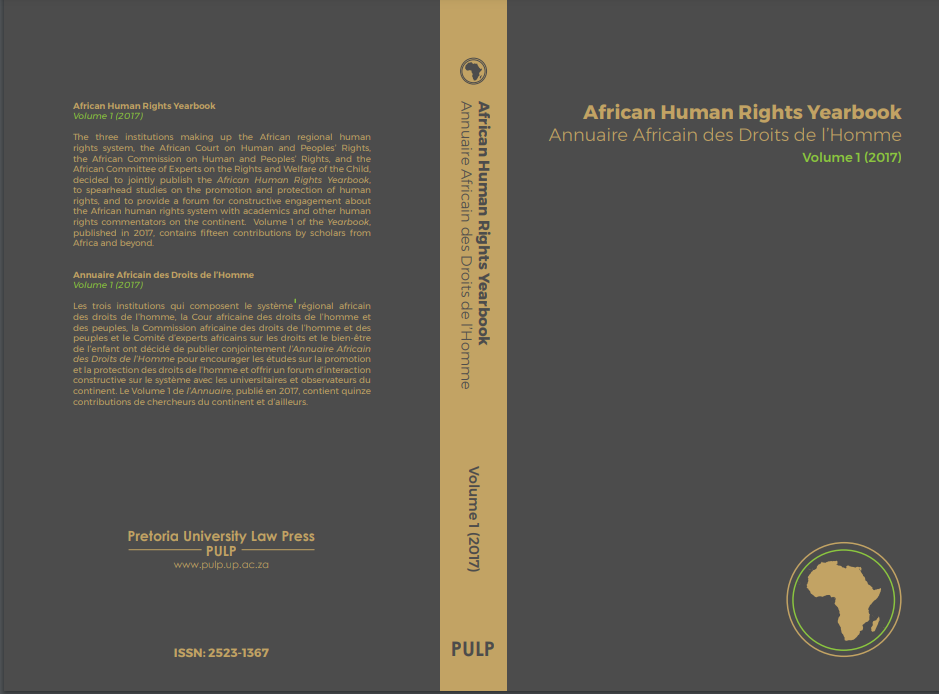‘It is better that ten guilty persons escape than that one innocent suffer’: the African Court on Human and Peoples’ Rights and fair trial rights in Tanzania
DOI:
https://doi.org/10.29053/2523-1367/2017/v1n1a15Keywords:
African Court on Human and Peoples’ Rights, fair trial rights, effective remediesAbstract
ABSTRACT: The African Court on Human and Peoples’ Rights (African Court) has recently been flooded with fair trial cases against its host state, Tanzania. To date, the African Court has disposed with five of these cases on the merits, and dismissed the other as being inadmissible. These cases are Abubakari v Tanzania, Jonas v Tanzania, Nganyi v Tanzania, Onyachi v Tanzania, and Thomas v Tanzania. Numerous similar cases, all alleging that Tanzania is in violation of fair trial rights as guaranteed in the African Charter on Human and Peoples’ Rights and other human rights instruments, are pending before the African Court. This article traces the involvement of the African Court, in the context of the five decided cases, in nurturing fair trial norms in Tanzania. On the one hand, the emerging Court jurisprudence on fair trial is of importance for the promotion and protection of fair trial norms on the continent; and, on the other hand, it is an opportunity for the African Court to firmly stamp its authority in this thematic domain, taking into account of the little jurisprudence it has in its disposal. In some cases, the African Court has shied away from granting effective remedies in favour of the applicants, whose fair trial rights were ruled to be violated. Further, an assessment of the cases gives an impression that the country’s judiciary and prosecuting authority are careless and sloppy in their application of fair trial standards. There therefore is a need for domestic fair trial rights to be strengthened.
TITRE ET RÉSUMÉ EN FRANÇAIS: ‘Il vaut mieux laisser s’échapper dix personnes coupables que de voir souffrir un seul innocent’: La Cour africaine des droits de l’homme et des peuples et le droit à un procès équitable en Tanzanie RÉSUMÉ: La Cour africaine des droits de l’homme et des peuples (Cour africaine) a récemment été inondée d’affaires concernant le droit à un procès équitable contre son pays d’accueil, la Tanzanie. À ce jour, la Cour africaine s’est prononcée au fond sur cinq de ces affaires et en a déclaré une autre irrecevable. Ces affaires sont Abubakari c Tanzanie, Jonas c Tanzanie, Nganyi c Tanzanie, Onyachi c Tanzanie et Thomas c Tanzanie. De nombreuses affaires similaires, toutes alléguant que la Tanzanie viole le droit à un procès équitable tel que garanti par la Charte africaine des droits de l’homme et des peuples et d’autres instruments relatifs aux droits de l’homme, sont pendantes devant la Cour africaine. Cet article retrace l’implication de la Cour africaine, en ce qui concerne les cinq affaires jugées, dans la promotion des normes de procès équitable en Tanzanie. D’un côté, la jurisprudence émergente de la Cour sur le procès équitable est importante pour la promotion et la protection des normes de procès équitable sur le continent; et, de l’autre, c’est l’occasion pour la Cour africaine d’affirmer fermement son autorité dans ce domaine thématique, compte tenu de la faible jurisprudence dont elle dispose. Dans certains cas, la Cour africaine s’est abstenue d’accorder des demandes efficaces aux requérants dont elle a conclu que les droits à un procès équitable avaient été violés. En outre, une évaluation de la jurisprudence donne l’impression que les autorités judiciaires et celle en charges des poursuites de l’Etat concerné sont imprudentes et négligentes dans l’application des normes du procès équitable. Il est donc nécessaire de renforcer le droit national en matière de procès équitable.


